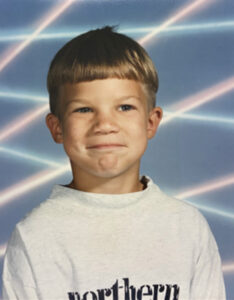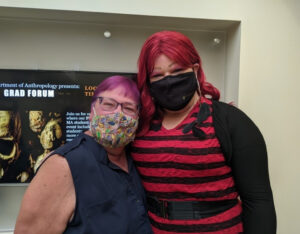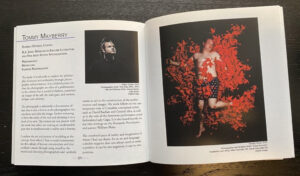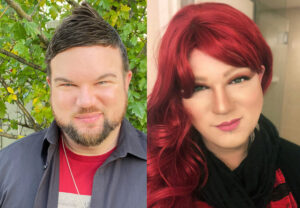Guest Article | Dr. Tommy Mayberry on Being Queer in Academia
During a recent interview process, a candidate asked me, “If you could go back and revisit your younger self from your current job and work, what advice would you give yourself?”
This question conjured up immediately for me that “What Advice Do You Have For Your Younger Self?” moment on RuPaul’s Drag Race, when RuPaul holds up to each competing queen a framed photo of their younger self and they, live on stage, reminisce and speak to the child they once were.

.
I had already thought deeply about what I would say to my younger self, being the queer and trans academic drag queen I am today. In fact, my dissertation ends with a letter to my seven-year-old self that I begin with “Dear Little Tommy” and that I close with (p. 228):
I love you, little one.
Good luck, and I’ll see you in twenty-seven years.
You’ve got this,
Tommy
Being queer in academia, to me, means exactly this: being me, unapologetically and unabashedly. It also means queering (as a verb) the academic processes, status quos, histories/herstories/theirstories/ourstories and contemporaries that just don’t seem to quite work anymore in being too straight (and narrow). I bring this queer being in academia through myself and to my work by channeling Stacey Waite and her work with Teaching Queer – “disrupting and interrupting myself,” inviting “contradictions into [my writing]” rather than keeping my contradictory self at bay, and “bringing in the aspects of self and story that shape the pedagogies I advocate” (p. 186).

.
I’ve never not been queer, I don’t think. If you ask her, my Mom might tell you that there was a moment when I was two that I went from being the most rambunctious, unbridled icon of a stereotypical Boy in His Terrible Twos to having an almost calm softness come out of me, coupled with a supreme sassiness and borderline arrogance.
This queerness of mine has shone through across my life, for better and, yes, most certainly for worse. Even though I somehow became valedictorian of my high school graduating class in 2006, I almost didn’t make it. By Waterloo Regional Police’s account, the high school I graduated from is, still to this day, the toughest, hardest, and most abusive high school in the region for adolescents who are even the tiniest bit different. The tiniest bit queer.

.
This queerness of mine has also shone through across my academic life – literally, me being queer in academia. In my undergraduate studies, many a time did I circumvent, transform, and queer my summative assignments in decidedly not doing the outlined project as designed. Across the disciplines, I created and submitted multiple paintings and creative writing pieces instead of essays – from both the “expected” disciplines like English Literature and Art History, as well as the unexpected ones like Sociology and Psychology). My playing-with and queering of the boundaries of academia became my entire project, focus, and intervention in my graduate studies as well: a gallery exhibition as part of my MA work; dragging up academic conferences as part of my MFA work; and queerly embracing Critical Race Theory and educational administrative leadership as part of my PhD work and career.
I have also brought this all powerfully into my own teaching, building this queerness right into some of my own assignments and assessments to give students not just choice, but autonomy. Some of my all-time favourite summative projects from my former students’ include: an original song written, played on guitar, and sung live while being recorded to submit; a synchronized swimming routine performed solo in a local pool; a handmade book of illustrated celebrities’ tweets; an oral presentation and costumed-performance as Dr. Victor Frankenstein requesting funding for his Creature; and a Minecraft-built model of campus for giving prospective students online tours during the height of the COVID-19 pandemic. My students might not have known, thought, or even, post-graduation, reflected and realized it – even perhaps still to this day – but my being queer in academia was extended to them, through them, and – I think, hope, and do believe – transformed them in so doing. In so being.
Maybe what being queer in academia really means is the creative world-building of embodied proportions that celebrates desires in opposition to the norm, to the status quo, and that allows us to, frees us to, enflames the passions and drives in us all to, unscriptedly play.
And to change the world in so doing.
In so being queer in academia.
About Tommy Mayberry:

Tommy Mayberry, PhD (he/she/they) is the founding Director of our inaugural Centre for Teaching Excellence and Innovation here at Yorkville University and Toronto Film School. As an academic drag queen, they have published their work in numerous journals and edited volumes and have performed and presented their scholarship and research findings nationally as well as internationally.
Tommy is co-editor (with Lindsay Bryde) of the award-winning book, RuPedagogies of Realness: Essays on Teaching and Learning with RuPaul’s Drag Race (McFarland 2022) – and currently have an equity and justice focused follow-up “shequel” edition in the works, too! – and Tommy is also a recipient of the University of Waterloo’s Award for Exceptional Teaching (2015) as well as of the 2024 CCCC Lavender Rhetorics Award for Excellence in Queer Scholarship.


